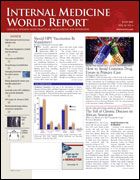Publication
Article
New Guidelines Endorse Routine HPV Vaccination
Author(s):
New recommendations issued by the Centers for Disease Control and Prevention's Advisory Committee on Immunization Practices (ACIP) call for routine vaccination against human papillomavirus (HPV) in all girls aged 11 to 12 years and "catch-up" vaccination for females aged 13 to 26 years.
In addition, the ACIP states that the vaccine can be used in girls as young as 9 years at the physician's discretion. They recommend catch-up vaccination for females aged 13 to 26 years who have not yet been vaccinated.
These recommendations are similar to those of the American Cancer Society (ACS), the American Academy of Pediatrics (AAP; formal recommendations pending), and the American Academy of Family Physicians (AAFP). These 3 organizations only differ from the ACIP in recommending catch-up vaccination for adolescents aged 13 to 18.
Cancer J Clin
The ACS states that current data are insufficient to recommend for or against universal vaccination of young women aged 19 to 26 years (CA. 2007;57:7-28). They state that the use of the vaccine in this age-group should be discussed by the woman and her physician, while noting that ideally the vaccine should be administered before first sexual intercourse.
The AAFP and the AAP have been careful to distance themselves from endorsing mandatory HPV vaccination. In a statement published online (www.aafp.org/online/en/home...), the AAFP contends that it is premature to consider the mandated use of the HPV vaccine for school entry, given the uncertainties about "long-term safety with widespread use, stability of supply, and economic issues." The AAFP adds that HPV does not qualify as an infectious disease in a school setting, in contrast to measles and chickenpox.
The economics of HPV vaccination are a concern to all of the organizations that have weighed in on the vaccine. Although the vaccination is cost-effective, the current HPV vaccine is one of the most expensive vaccines. And if consumers are asked to pay, will the underinsured and uninsured be able to afford it?
A bivalent vaccine (Cervarix; GlaxoSmithKline), which targets the high-risk HPV types 16 and 18, is currently under review by the FDA. The new ACIP recommendations naturally apply only to the quadrivalent vaccine and may need to be revised if a second vaccine becomes available.
The Evidence
- HPV is the most common sexually transmitted infection in the United States; at least 80% of women are infected by age 50 years, and 6.2 million new infections occur each year
- Immunization is most effective before first sexual intercourse
- 74% of infections occur in persons aged 15 to 24 years
- Two high-risk strains, HPV 16 and 18, are responsible for about 70% of cervical cancer cases, resulting in 3700 deaths annually
- HPV types 6 and 11 are responsible for about 90% of genital warts
- There is no treatment for HPV infection
- The quadrivalent HPV vaccine (Gardasil) has demonstrated near-100% efficacy against HPV types 6, 11, 16, and 18, with safety up to 5 years.
New ACIP Recommendations for HPV Vaccine
- Administer the first dose to girls aged 11 to 12 years (minimum age, 9 years)
- Administer the second dose 2 months after the first dose
- Administer the third dose 6 months after the first dose
- Administer the HPV vaccine series to females aged 13 to 26 years who have not yet been vaccinated (the ACS, AAP, and AAFP recommended age range is 13 to 18)
- Those who receive the vaccine should follow recommendations for cervical cancer screening with Pap tests.






